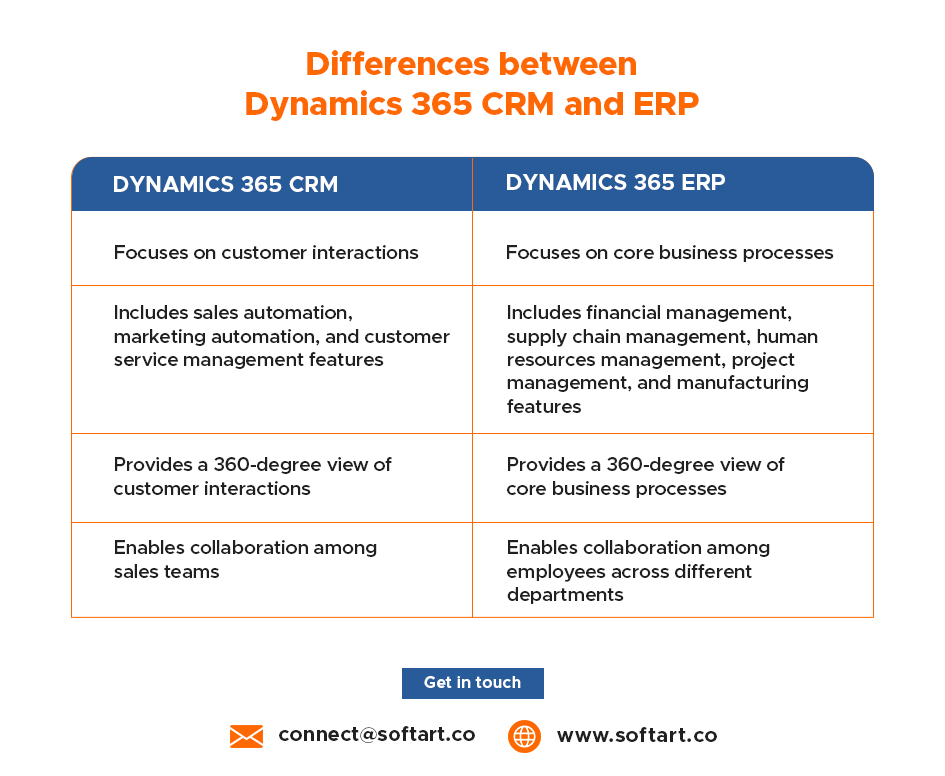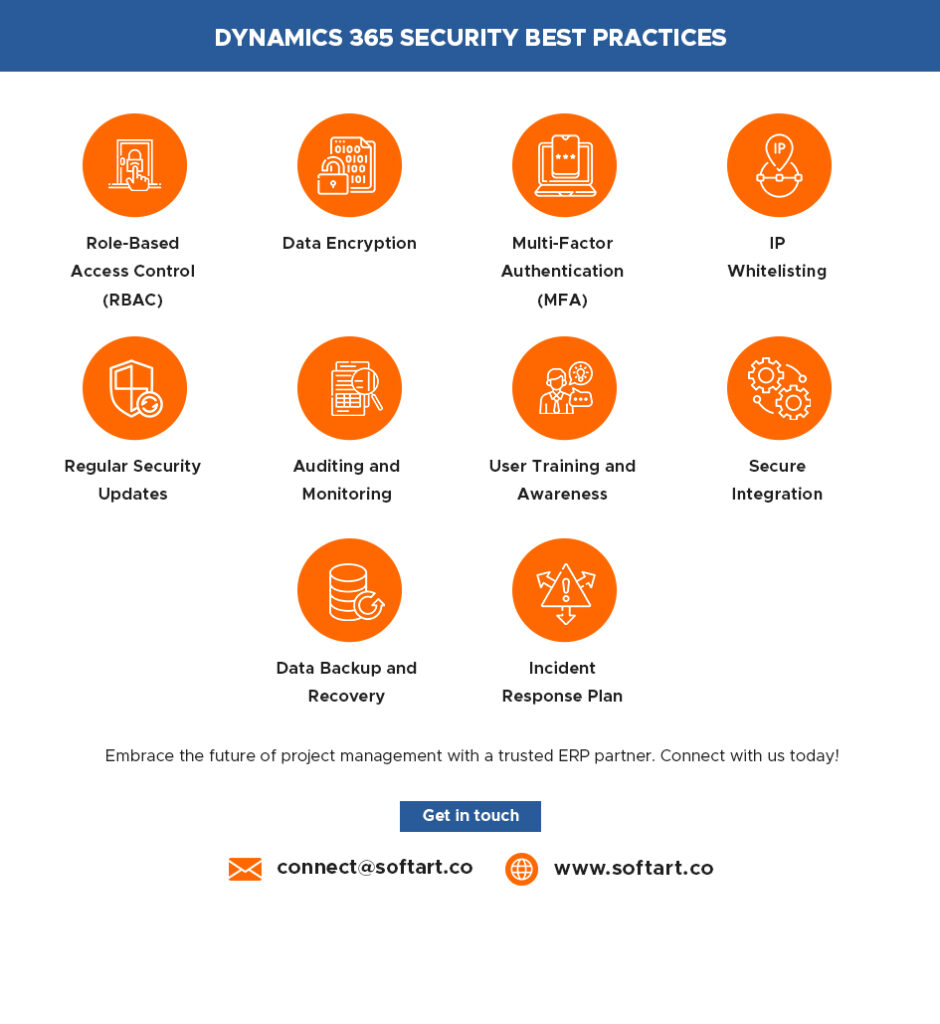
Dynamics 365 is a suite of cloud-based business applications from Microsoft that helps organizations streamline their business processes and improve productivity. Dynamics 365 includes two main components: Customer Relationship Management (CRM) and Enterprise Resource Planning (ERP). Both CRM and ERP are designed to help organizations manage their operations more efficiently and effectively. However, there are some key differences between the two. In this article, we will explore the key differences and benefits of Dynamics 365 CRM vs ERP and help you choose the right solution for your business
Dynamics 365 CRM is a customer relationship management tool that helps organizations manage their interactions with customers and prospects. It provides a 360-degree view of customer interactions and enables organizations to track customer interactions across multiple channels, including email, phone, and social media. Dynamics 365 CRM also includes sales automation, marketing automation, and customer service management features.
Dynamics 365 ERP, on the other hand, is an enterprise resource planning tool that helps organizations manage their financials, inventory, supply chain, and other core business processes. It enables organizations to automate business processes, reduce manual data entry, and improve accuracy. Dynamics 365 ERP includes modules for finance, supply chain management, human resources, and project management
As mentioned earlier, Dynamics 365 CRM is a customer relationship management tool that helps organizations manage their interactions with customers and prospects. The following are six key features and benefits of Dynamics 365 CRM:
Dynamics 365 ERP is an enterprise resource planning tool that helps organizations manage their financials, inventory, supply chain, and other core business processes. The following are six key features and benefits of Dynamics 365 ERP:
The following table summarizes the key differences between Dynamics 365 CRM and ERP:

Choosing the right solution for your business can be a daunting task. That’s why it’s important to work with a trusted partner like SoftArt. SoftArt is a Microsoft Gold Certified Partner that specializes in Dynamics 365 implementation and support. We have the expertise and experience to help you choose the right solution for your business and ensure a smooth implementation.
Whether you need Dynamics 365 CRM, ERP, or both, SoftArt can help. We offer a range of services, including implementation, customization, training, and support. We can also help you integrate Dynamics 365 with other business applications to streamline your operations and improve productivity.
In conclusion, Dynamics 365 CRM and ERP are powerful tools that can help organizations manage their operations more efficiently and effectively. While both solutions share some similarities, they are designed to address different business needs. By understanding the key differences and benefits of Dynamics 365 CRM vs ERP, you can choose the right solution for your business and achieve your goals. Contact SoftArt today to learn more about how we can help you leverage Dynamics 365 to drive business growth.
Microsoft Dynamics 365 CRM is a powerful tool that helps businesses streamline their customer relationship management processes. However, with great power comes great responsibility, especially when it comes to data security and compliance. In today’s digital age, protecting sensitive customer information and ensuring compliance with industry regulations is more important than ever.
Let’s talk about the importance of data security and compliance in Microsoft Dynamics 365 CRM and provide you with best practices to help you safeguard your data.
Data security and compliance are crucial aspects of any CRM system, and Microsoft Dynamics 365 CRM is no exception. With the increasing number of data breaches and cyber threats, businesses need to take proactive measures to protect their customer data. By implementing robust security measures, you can prevent unauthorized access to sensitive information and maintain the trust of your customers.
Compliance with industry regulations is equally important. Depending on the nature of your business and the industry you operate in, you may be subject to various data protection and privacy regulations. Failure to comply with these regulations can result in hefty fines and damage to your reputation. Therefore, it is essential to understand the specific compliance requirements relevant to your organization and ensure that your Microsoft Dynamics 365 CRM system is configured accordingly.
To ensure data security in Microsoft Dynamics 365 CRM, it is crucial to follow best practices. Here are eight key practices that you should consider implementing:
Implement role-based access control to ensure that users only have access to the data they need to perform their job functions. This helps prevent unauthorized access and reduces the risk of data breaches.
Encrypting sensitive data is essential to protect it from unauthorized access. Microsoft Dynamics 365 CRM provides built-in encryption capabilities that you can leverage to safeguard your data.
Regularly backing up your data is crucial in case of data loss or system failures. Ensure that you have a robust backup strategy in place to minimize the impact of any unforeseen events.
Implement strong user authentication mechanisms, such as multi-factor authentication, to prevent unauthorized access to your Microsoft Dynamics 365 CRM system.
Implement robust monitoring and logging mechanisms to track user activities and detect any suspicious behavior. This can help you identify and respond to security incidents promptly.
Keep your Microsoft Dynamics 365 CRM system up to date by installing the latest security patches and updates. This helps address any vulnerabilities and ensures that you are protected against the latest threats.
Define clear policies for data retention and disposal to ensure that unnecessary data is not retained beyond the required period. This helps reduce the risk of data exposure and facilitates compliance with data protection regulations.
Train your employees on data security best practices and raise awareness about the importance of data protection. Regular training sessions can help mitigate the risk of human error and ensure that employees understand their role in safeguarding data.

Compliance with industry regulations is essential for businesses operating in various sectors. Microsoft Dynamics 365 CRM provides features and capabilities that can help you meet these compliance requirements. However, it is important to understand the specific regulations applicable to your industry and ensure that your system is configured accordingly.
For example, if you operate in the healthcare industry, you may need to comply with regulations such as the Health Insurance Portability and Accountability Act (HIPAA). In this case, you would need to configure your Microsoft Dynamics 365 CRM system to ensure that patient data is protected and access is restricted to authorized personnel only.
Similarly, if you operate in the financial services sector, you may need to comply with regulations such as the Payment Card Industry Data Security Standard (PCI DSS). In this case, you would need to implement robust security measures to protect payment card data and ensure that your Microsoft Dynamics 365 CRM system is PCI DSS compliant.
It is important to work closely with your IT and legal teams to ensure that your Microsoft Dynamics 365 CRM system is configured in accordance with the relevant regulations. Failure to comply with industry regulations can have severe consequences, including legal penalties and damage to your reputation.
Ensuring data security and compliance in Microsoft Dynamics 365 CRM can be a complex task. That’s where Dynamics 365 consulting comes in. A Dynamics 365 consulting partner can provide you with the expertise and guidance you need to navigate the intricacies of data security and compliance.
A reputable consulting partner, such as SoftArt, can help you assess your current security measures, identify any gaps, and develop a comprehensive security strategy tailored to your organization’s needs. They can assist you in implementing best practices, configuring your Microsoft Dynamics 365 CRM system, and ensuring compliance with industry regulations.
Working with a consulting partner not only ensures that your data is secure and compliant but also allows you to focus on your core business activities. By leveraging their expertise, you can save time and resources while having peace of mind knowing that your data is protected.
When it comes to choosing a Dynamics 365 consulting partner, it is important to select a trusted and experienced firm that understands your business needs. SoftArt is a leading provider of Dynamics 365 consulting services with a proven track record of helping businesses achieve their data security and compliance goals.
With a team of highly skilled consultants, SoftArt can guide you through the entire process, from assessing your security needs to implementing best practices and ensuring compliance. They have extensive experience working with Microsoft Dynamics 365 CRM and can tailor their services to meet your specific requirements.
By choosing SoftArt as your Dynamics 365 consulting partner, you can benefit from their deep industry knowledge, technical expertise, and commitment to delivering exceptional results. They will work closely with you to understand your unique challenges and develop a customized solution that addresses your data security and compliance needs.
Data security and compliance are of utmost importance in Microsoft Dynamics 365 CRM. By understanding the importance of data security and compliance, implementing best practices, and working with a trusted consulting partner like SoftArt, you can ensure that your valuable data is protected and your organization remains compliant with industry regulations.
Don’t compromise when it comes to data security and compliance. Choose SoftArt as your Dynamics 365 consulting partner and take the necessary steps to safeguard your data and protect your business. Contact SoftArt today to learn more about their comprehensive range of consulting services and how they can help you achieve your data security and compliance goals.